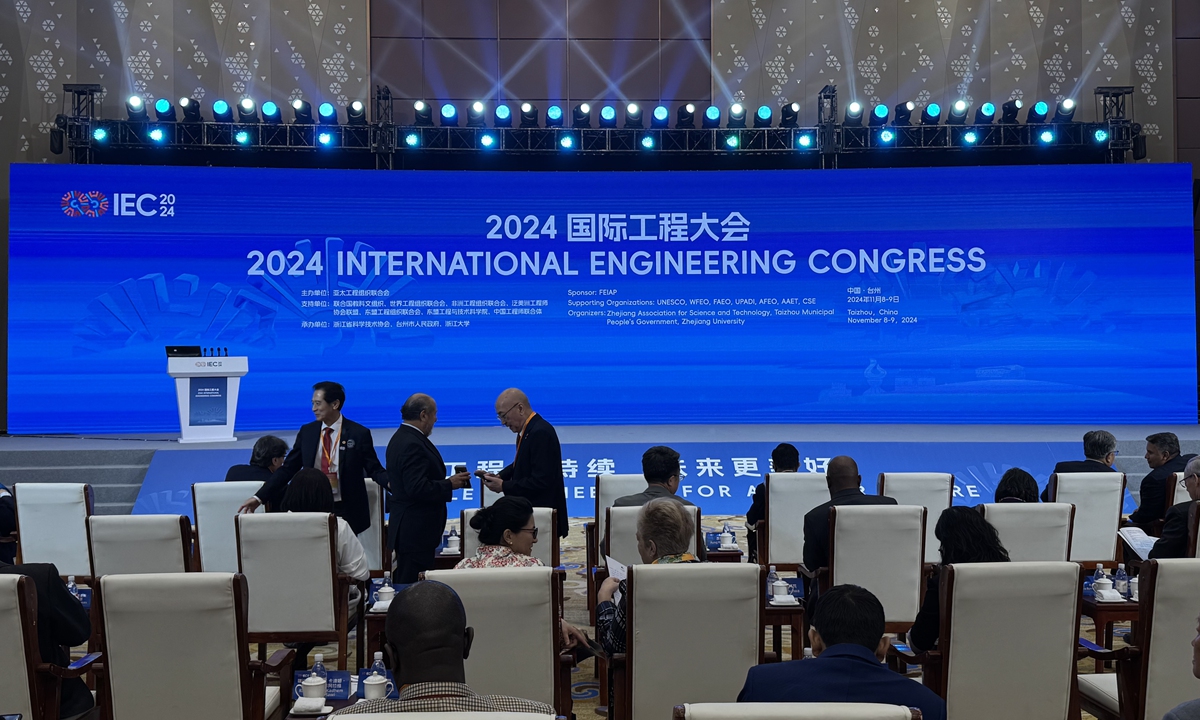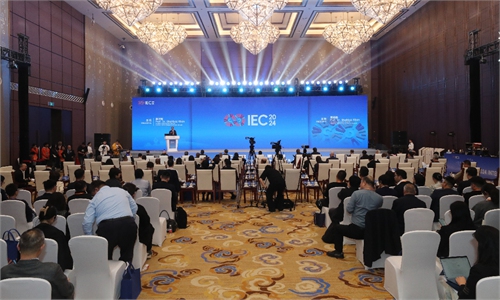BRI partner countries laud China’s engineering achievements, call for enhanced cooperation at 2024 IEC

The 2024 International Engineering Congress (IEC) in Taizhou, Zhejiang Province, East China concluded on September 10. The conference themed as "Sustainable Engineering for a Better Future," organized by the Federation of Engineering Institutions of Asia and the Pacific (FEIAP). Photo: Chen Qingrui
The 2024 International Engineering Congress (IEC) in Taizhou, Zhejiang Province, East China, concluded on Sunday. At the event, engineering sector leaders expressed strong appreciation for China's support and anticipated increasing cooperation with China across the engineering sector.
"How China is working in their country is marvelous development—huge development in infrastructure, fast railways, and almost all engineering fields. This conference gives us an opportunity to learn from each other and to collaborate with the Chinese," Nasir Mahmood Khan, Secretary-general of Pakistan Engineering Council (PEC) told the Global Times on Saturday.
The conference, themed "Sustainable Engineering for a Better Future," was organized by the Federation of Engineering Institutions of Asia and the Pacific (FEIAP) with support and participation by 200 delegates from 41 economies and 50 national, regional and international organizations.
Nasir Mahmood Khan told the Global Times that the conference, along with the China-Pakistan Economic Corridor (CPEC) and Belt and Road Initiative, has been particularly beneficial for Pakistan. "Conferences like this help us to bring harmonization in the engineering standards, engineering, education, equivalence and also transfer of technology, the new emerging areas of technology," he said.
"On Friday we signed a deal with the Chinese Association of Science and Technology (CAST) to collaborate for capacity building of Pakistani engineers so that they can get the opportunity to work with Chinese companies," Nasir Mahmood Khan said. "Pakistani engineers will be recognized by the Chinese side. This will really take a big initiative towards working together in engineering, education, profession, capacity building, internships, and training."
The field of engineering technology is viewed as a crucial foundation for economic development, holds a pivotal role in Belt and Road cooperation.
Jeffrey Chiang Choong Luin, President of the Institution of Engineers Malaysia (IEM) and Former Chairman of the ASEAN Federation of Engineering Organizations (AFEO), told the Global Times that he hopes Malaysia and ASEAN can work closely together with China in infrastructure, especially in high-speed rail, connectivity in roads, tunnels, and bridges, shipping, logistics, and more to enhance mobility and trade growth.
"We have the East Coast Rail Link, now under construction with Chinese cooperation, which is nearing completion. I think by 2026 it will be operational in Malaysia. There is also potential for a high-speed rail connecting Kuala Lumpur to Singapore, spanning over 400 kilometers, which would reduce travel time from four hours to probably two hours," said Chiang.
The BRI has opened doors for developing countries to build better infrastructure, such as road projects that improve access to solar energy, water resources, and small-scale hydro energy, Shahbaz khan, Director of United Nations Educational, Scientific and Cultural Organization (UNESCO) Regional office for East Asia, told the Global Times. "Very importantly, it also focuses on building e-infrastructure to improve telecommunications," Shahbaz khan added.
"The benefits of these projects eventually lead to better lives for people. A better life for people means better job opportunities, rising trade and shared prosperity," Shahbaz khan said.
During the 2024 China-ASEAN Engineers Forum held in October, the Chinese Society of Engineers (CSE) announced it would make available continuing professional development courses to engineering organizations in ASEAN countries and provide opportunities for ASEAN engineers to conduct research and training in China, according to a statement that CSE sent to the Global Times.
The CSE noted that it will commit to strengthening global cooperation and exchange with engineering organizations to promote the use of science and technology for exploration and innovation, to benefit the human kind.
Those efforts will empower the engineering community to improve governance, advance UN Sustainable Development Goals, and contribute to a more inclusive, equitable, sustainable, and peaceful future.
"There is a knowledge revolution happening alongside infrastructure development. The BRI brings together science, technology, and enhanced education to equip young people to become future entrepreneurs and business leaders, fostering better relationships and understanding among nations, as well as between Chinese and other cultures, which is the beauty of the initiative," Shahbaz khan said.

